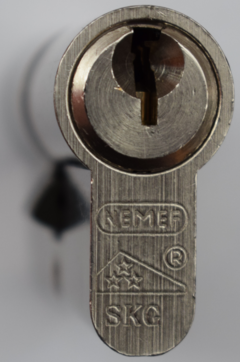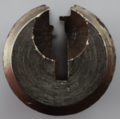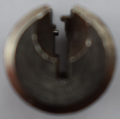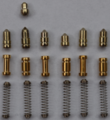Nemef NF3: Difference between revisions
mNo edit summary |
m (clean-up, spec) |
||
| Line 8: | Line 8: | ||
| lock_design = [[Pin_tumbler|Pin-tumbler]] | | lock_design = [[Pin_tumbler|Pin-tumbler]] | ||
| patent = | | patent = | ||
| years_produced = | | years_produced = | ||
| ratings = SKG*** | |||
| related = | | related = | ||
| spec_on = | | spec_on = true | ||
| spec_comptype = | | spec_comptype = [[Pin_tumbler|Pin-tumbler]] | ||
| spec_comp = | | spec_comp = 6 | ||
}} | }} | ||
The '''NF3''' is | The '''NF3''' '''(or 132/9)''' is an SKG***-rated [[Pin_tumbler |pin-tumbler]] lock made by [[Nemef]]. Compared to the '''[[Nemef NF2 |NF2]]''', it contains more anti-drill protection elements, unauthorized key copying prevention in the form of the security card, and finally there is a "hidden warding" element. | ||
__TOC__ | __TOC__ | ||
| Line 22: | Line 23: | ||
== Principles of operation == | == Principles of operation == | ||
:''See also: [[ | :''See also: [[Pin_tumbler#Principles_of_operation|Pin-tumbler (Principles of operation)]]'' | ||
The lock contains six pin stacks. Its most distinctive feature is the use of multiple diameter keypins, which together with a special warding causes the key pin tips at rest aren't at the same level (sometimes referred to as "shadow drilling"). These features provide additional resistance to [[key bumping]] attacks. The pin stacks alternate between serrated and spooled drivers, but due to the way the key pins rest in the chambers, the spools effectively engage only when paired with three shortest key pins. All of the drivers have slightly tapered tips | The lock contains six pin stacks. Its most distinctive feature is the use of multiple diameter keypins, which together with a special warding, causes the key pin tips at rest aren't at the same level (sometimes referred to as "shadow drilling"). These features provide additional resistance to [[key bumping]] attacks. The pin stacks alternate between serrated and spooled drivers, but due to the way the key pins rest in the chambers, the spools effectively engage only when paired with three shortest key pins. All of the drivers have slightly tapered tips. | ||
The warding is not very restrictive and the keyway itself is not paracentric. | The warding is not very restrictive and the keyway itself is not paracentric. | ||
There is a passive pin inserted into the core, although there is no corresponding groove in the bible, which means the pin serves only as a "hidden warding". Looking at the left side of the key, there is visible groove, with which the pin interacts. Interestingly enough, there is an anti-drilling element just behind this passive pin. | There is a passive pin inserted into the core, although there is no corresponding groove in the bible, which means the pin serves only as a "hidden warding". Looking at the left side of the key, there is visible groove, with which the pin interacts. Interestingly enough, there is an anti-drilling element just behind this passive pin. | ||
== Disassembly instructions == | == Disassembly instructions == | ||
To disassemble a double euro cylinder, use of a pinning shoe is the preferred method. | To disassemble a double euro cylinder, use of a pinning shoe is the preferred method. | ||
| Line 42: | Line 45: | ||
* [[Lockpicking]] | * [[Lockpicking]] | ||
* [[Decoding]] | * [[Decoding]] | ||
* [[Key bumping]] | * [[Key bumping]] | ||
* [[Impressioning]] | * [[Impressioning]] | ||
== Gallery == | == Gallery == | ||
<div align="center"><gallery> | <div align="center"><gallery> | ||
File:Nemef NF3 key least.png|Nemef NF3 | File:Nemef NF3 key least.png|Nemef NF3 keys. | ||
File:Nemef NF3 warding least.png|Nemef NF3 keyway detail. | File:Nemef NF3 warding least.png|Nemef NF3 keyway detail. | ||
File:Nemef NF3 warding1 least.png|Nemef NF3 keyway with the "hidden warding" antidrill element in focus. | File:Nemef NF3 warding1 least.png|Nemef NF3 keyway with the "hidden warding" antidrill element in focus. | ||
| Line 69: | Line 72: | ||
* [https://www.youtube.com/watch?v=0CmCtI7-CWc&t=392s Artichoke2000's Nemef NF2 analysis] | * [https://www.youtube.com/watch?v=0CmCtI7-CWc&t=392s Artichoke2000's Nemef NF2 analysis] | ||
[[Category:Lock models]] | |||
[[Category:Nemef]] | [[Category:Nemef]] | ||
[[Category:Pin-tumbler locks]] | [[Category:Pin-tumbler locks]] | ||
[[Category:SKG locks]] | |||
Latest revision as of 22:35, 25 December 2022
Nemef NF3
| Nemef NF3 | |
 | |
| Name | Nemef NF3 |
|---|---|
| Manufacturer | Nemef |
| Lock Type | Cylinder |
| Lock Design | Pin-tumbler |
| Security Rating(s) | SKG*** |
| Specifications | |
| # of Components | 6 |
| Component Type | Pin-tumbler |
The NF3 (or 132/9) is an SKG***-rated pin-tumbler lock made by Nemef. Compared to the NF2, it contains more anti-drill protection elements, unauthorized key copying prevention in the form of the security card, and finally there is a "hidden warding" element.
Principles of operation
- See also: Pin-tumbler (Principles of operation)
The lock contains six pin stacks. Its most distinctive feature is the use of multiple diameter keypins, which together with a special warding, causes the key pin tips at rest aren't at the same level (sometimes referred to as "shadow drilling"). These features provide additional resistance to key bumping attacks. The pin stacks alternate between serrated and spooled drivers, but due to the way the key pins rest in the chambers, the spools effectively engage only when paired with three shortest key pins. All of the drivers have slightly tapered tips.
The warding is not very restrictive and the keyway itself is not paracentric. There is a passive pin inserted into the core, although there is no corresponding groove in the bible, which means the pin serves only as a "hidden warding". Looking at the left side of the key, there is visible groove, with which the pin interacts. Interestingly enough, there is an anti-drilling element just behind this passive pin.
Disassembly instructions
To disassemble a double euro cylinder, use of a pinning shoe is the preferred method.
Other possibility is to use a segmented follower, but that requires that both cores are pulled out a bit to allow a cam removal. Then a core should be rotated to approximately 4:30 or 7:30 o'clock position (135 degrees either clockwise or anti-clockwise) to prevent driver entering a gaps for the cam clutch. Then a segmented follower can be used to remove the core.
When assembling the lock, take care to insert the cam clutch oriented correctly (see the notch on the top of the key blade), otherwise it would be impossible to fully insert the key into the lock.
Vulnerabilities
The Nemef NF3 is vulnerable to one or more of the following:
Gallery
References








